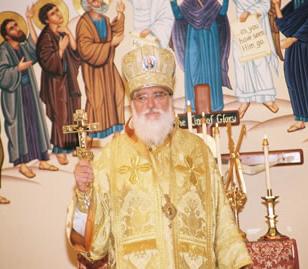In an effort to bridge the gulf with the west, Gregory of Cyprus, Patriarch of Constantinople (1283-9), followed by St. Gregory Palamas (1296-1359), maintained that not only is the Spirit sent by the Son into the world but there is also, within the inner life of the Trinity, an “eternal manifestation” (aïdios ekphansis) of the Spirit by the Son. In this sense of “eternal manifestation”, so they argued, the Spirit may correctly be said to proceed “through” (dia) or even “from” (ek) the Son. But the two Gregories were careful to distinguish this “manifestation” from “procession” in the strict sense. “Manifestation”, as they understood it, did not signify a relationship of hypostatic origin: so far as the origin of the Spirit was concerned, they agreed with Photius that He proceeds from the Father alone. Between the Trinitarian doctrine of the two Gregories and that of the west there is perhaps no basic contradiction, so long as the western teaching is presented in its more ancient form, as expounded, for example, by Augustine. According to Augustine, the Spirit proceeds “principally” (principaliter) from the Father, and from the Son only in a secondary and derivative sense. Is this “secondary and derivative sense” of procession wholly different from the “eternal manifestation” accepted by the two Gregories? In Augustine’s teaching the “monarchy” of the Father is still preserved, since the Father remains the only ultimate “source” and arche of the Godhead. There is a considerable difference between this earlier western view and the later Scholastic doctrine, as upheld by the west at [the councils of] Lyons and Florence, whereby the Spirit proceeds from Father and Son “as from one principle”, tanquam ex (or ab) uno principio. This Scholastic theory, in contrast to that of Augustine, no longer affirms a personal principle of unity in the Godhead; the source of unity is now the divine essence, and the Cappadocian notion of the Father’s “monarchy” is abandoned. The difference in teaching between Augustine and the Scholastics is probably greater than that between Augustine and the Cappadocians. If we take as our standard of western Trinitarian teaching, not Lyons and Florence, but Augustine’s work On the Trinity, then it is far easier to treat the filioque question as a matter of alternative theologoumena and not a dogmatic conflict. (From “Christian Theology in the East,” in A History of Christian Doctrine, edited by Hubert Cunliffe-Jones [Philadelphia: Fortress Press, 1980], p. 210)

Orthodox Bishop Kallistos Ware
The Nicene Creed and the Filioque: A Lutheran Approach
The Father as “the Source of the Godhead” and the Eternal Procession of the Holy Spirit
Return to the Lutheran Theology Web Site Home Page
alternative URL for this web page:
http://tinyurl.com/y6yrwd